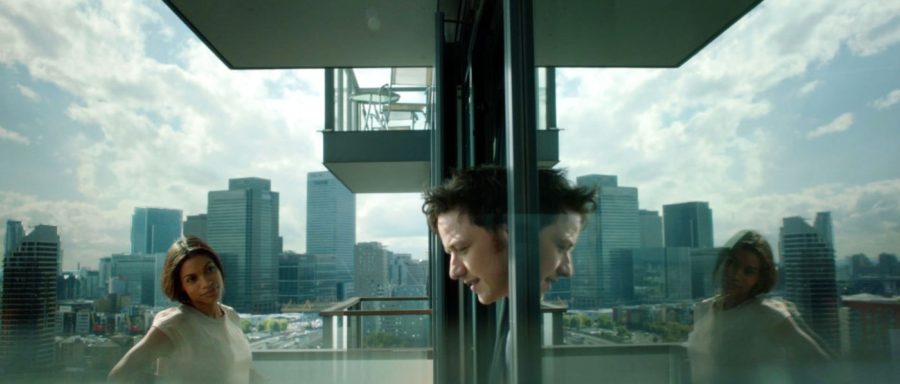Trance, the latest film from acclaimed British director Danny Boyle (127 Hours, Slumdog Millionaire), is another in the long line of movies attempting to disrupt the viewer’s perception of reality. James McAvoy stars as Simon, an art auctioneer who conspires with a group of thieves led by Franck (Vincent Cassel) to steal a multimillion-dollar painting. In the course of the heist, Simon suffers a head injury and forgets what happens to the painting. The group of con artists then enlists hypnotherapist Elizabeth (Rosario Dawson) to help recover Simon’s memories.
However, as the characters begin to delve into each other’s psyches, the intrigue between them grows to encompass far more than just a valuable painting. The film goes through constant changes and escalations as the pasts of certain characters are revealed to be connected, causing them to inevitably turn on each other. These plot twists elevate what at first seems to be just a classic heist film, morphing it into a surreal psychological thriller and finally ending as an intense focus on an emotional and physical struggle between the three leads. For a film that starts out feeling so modern, it is surprising yet effective when Trance’s final act achieves the drama of a Greek tragedy.
A slew of initially disconnected plots and styles blend together thanks to a fast pace which keeps the film tight and trimmed. A relatively short runtime (under two hours) keeps any of the film’s distinct acts from being overbearing or bloated, contributing to a much more coherent whole. Today it is surprising and refreshing to see any film, let alone one by a world-class director such as Boyle, limit its duration.
Despite the craft with which it is told, the story sometimes suffers from the inconsistency of its characters. McAvoy’s emotional shifts help pace the film, but the other two leads’ motivations become extremely confused from their relatively straightforward beginnings. Cassel in particular is pulled around haphazardly by a largely unbelievable romance with Dawson, ultimately ending up without any satisfying character resolution.
Dawson’s character may actually be the film’s most interesting. She helps reveal darker aspects of McAvoy, including a drug and gambling addiction, and becomes the closest thing Trance has to a stable emotional center. Dawson’s initially confusing motives are cleared up in a twist regarding her past with McAvoy’s character that is beautiful if not a little too clean. Despite leaving a sizable plot hole, Dawson’s arc nicely ties up the film’s intentional study of relationships, specifically one person’s control over another.
The hypnotism itself is well integrated into the film’s plot so long as the audience accepts the conceit that it affords near-magical authority over others. While the film does play with some scenes in regards to reality, there is generally little question as to what is real and what is a trance. Regardless, Boyle opts to give the entire world, dream and reality alike, a surreal quality that draws occasionally from the world of fine art (though not the kind that is being stolen). This is helped by repeating images, such as McAvoy’s window tapping, or his gripping of a key ring with bandaged fingers. There is little in the way of sunlight or the outdoors, leaving a number of dark indoor shots lit only by a primary color scheme.
These elements highlight the thoughtful construction of Trance, both visually and thematically. The film telegraphs its hidden plot elements without revealing anything about them, leaving the audience eager to delve further into the movie. And the dreamlike atmosphere only helps pull viewers into each character’s psyche, entrancing them with its surrealism. All of the dreams and diversions only make the final act more potent as the film reaches its contrastingly real and brutal climax.
Yet potent as it may be, the film’s ending feels tonally awkward and unnecessarily happy. To some it may take the punch out of the resolution and further confuse the character’s motives, but personally speaking, it didn’t detract much from what was a tense and enjoyable experience.








